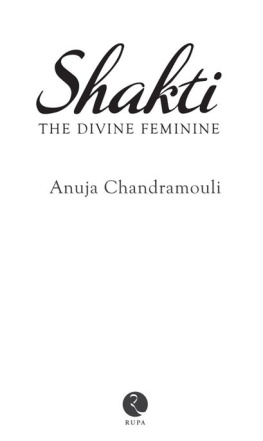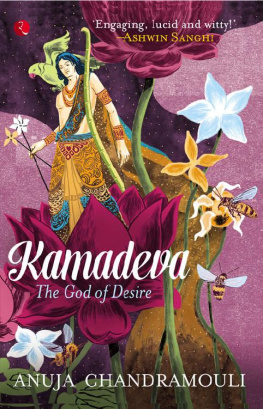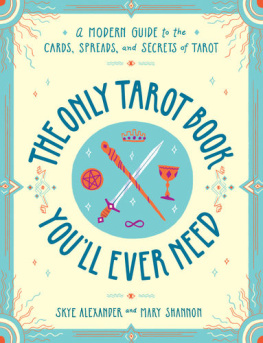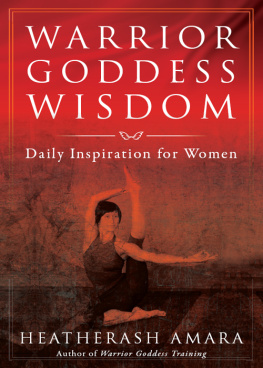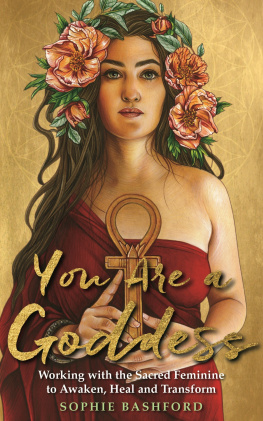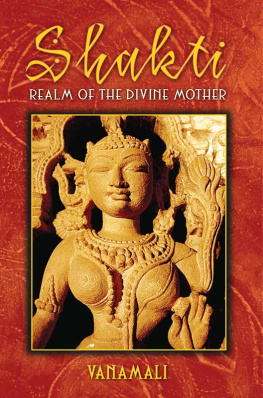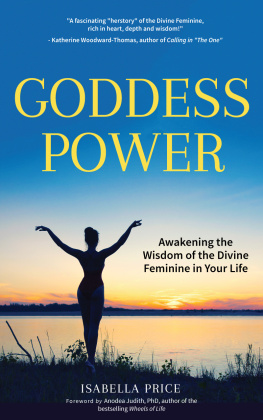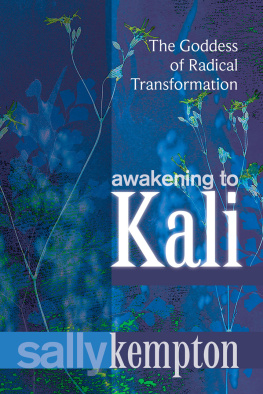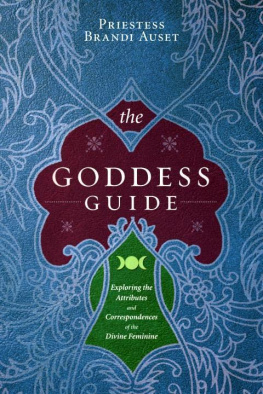
Anuja Chandramouli graduated from Womens Christian College, Chennai, and was the college topper in Abnormal Psychology. She also holds a masters degree in English. Currently, she is studying classical dance. Her debut novel, Arjuna: Saga of a Pandava Warrior-Prince, was named as one of the top five books in the Indian Writing category by Amazon India in 2013. She is also the author of the bestselling novel Kamadeva: The God of Desire.
Anuja is the mother of two little girls and lives in Sivakasi. To know more about her, log on to
Also by the author:
Kamadeva: The God of Desire

Published by
Rupa Publications India Pvt. Ltd 2015
7/16, Ansari Road, Daryaganj
New Delhi 110002
Copyright Anuja Chandramouli 2015
This is a work of fiction. Names, characters, places and incidents are either the product of the authors imagination or are used fictitiously and any resemblance to any actual person, living or dead, events or locales is entirely coincidental.
All rights reserved.
No part of this publication may be reproduced, transmitted, or stored in a retrieval system, in any form or by any means, electronic, mechanical, photocopying, recording or otherwise, without the prior permission of the publisher.
eISBN: 978-81-291-3812-5
First impression 2015
10 9 8 7 6 5 4 3 2 1
The moral right of the author has been asserted.
This book is sold subject to the condition that it shall not, by way of trade or otherwise, be lent, resold, hired out, or otherwise circulated, without the publishers prior consent, in any form of binding or cover other than that in which it is published.
To the three Shaktis in my life:
Rajeshwari: You remain the best and most beautiful soul there ever was. Miss you more than I can bear, perims.
Gowri: No matter how dark the world becomes, your inner goodness shines bright and warms the spirit.
Thank you for that, perims, and so much more.
Maheshwari: My mother, my friend, my life.
Love itself she is;
Yet miseries she inflicts
To make and break is her play
In her is happiness boundless.
Subramania Bharathiar, in praise of Parasakthi
Thus, O king, does the blessed Devi, though eternal, manifest again and again for the protection of the world.
By her this universe is deluded. She herself brings forth everything. Entreated, she bestows right knowledge; propitiated, she bestows prosperity.
O king, by her all this universe is pervaded, by Mahakali, who takes form as the great destroyer at the end of time.
At that time, she herself is the great destroyer. Existing from all eternity, she herself becomes the creation. She, the eternal one, sustains all beings.
In times of well-being she is indeed good fortune, granting prosperity in the homes of humankind. In times of privation, she exists in misfortune, bringing about ruin.
Devadutta Kali, Devimahatmyam: In Praise of the Goddess
From Kalki Krishnamurthy, Sivakamiyin Sabadam: The Bikshus Love (Vol.3) tr. Nandini Vijayaraghavan, Litintrans, 2012.
Contents
Authors Note
This is not so much an Authors Note as it is a gentle reminder to my readers: Shakti is a story, which was manufactured in a factory designated for that express purpose in the subterranean regions of my brain, in collusion with the more twisted elements of a convoluted mind that has long been a source of despair for my mum.
Some of you might be feeling a tad inquisitive about which parts of this tale are true, and which parts are fictionalized or extracted in various states of purity from documented mythology. All I can say is, please dont bother your head too much about it, since there is no way of ascertaining to an absolute certainty what is true and what isnt, or what is fact and what is fiction, in the realms of myth and the real world, for that matter. In any case, such things are of little consequence in this particular instance, because this offering of make-believe is intended solely to be an intense experience from which the reader can take or leave whatever he or she pleases, in keeping with personal preferences and individual inclinations.
Many thanks and much love!
Before the Beginning
E VERYTHING IN EXISTENCE has a point of origin, or so it is believed. The Goddess, however, had never felt the need to go past her roots to the very beginning, whatever that may be. It was sure to have involved messy copulation, spilled seminal fluids and tumultuous emotions, making it a nasty business. Or was she like the much-admired circle, without beginning or end? It was a depressing thought, since despite the seeming profoundity, it was daunting to imagine spending eternity going around in circles.
For her, it had all begun when love happenednot just to her, but to the males in her life. Many had lost their heads over her, but only three matteredthe Creator, who had wanted her with a frenetic need; the Preserver, who had had the good sense to love her without falling in love with her; and the Destroyer, whose love for her was so all-encompassing that she had allowed herself to be consumed by it before fleeing from it, only to return and repeat the exhausting cycle.
Brahma, the Creator, was the first, or so he claimed, to have been at the receiving edge of her cruelty. He fancied that he loved her from the moment he became aware of her presence, shortly after he had sprung forth from the purity of his own consciousness; after all, he was Svayambahuone who was self-extant.
From his soul, words of power surged forth in her praisePrakriti, Adishakti, Mayashe was the divine feminine and within her lay the key to life itself. He bestowed on her thousands of names in praise of her exquisite beauty and marvellous qualities; each name was a blessing and a form of worship. Existence would be impossible without her, Brahma realized as he allowed the heat of his desire to warm up the cold and sterile chambers of his great mind. As his ardour burned with increasing intensity, he dreamed of an eternity with her by his side.
Alas, it was not to be and she made it abundantly and painfully clear to him. Brahma approached her, the gift of desire in his outstretched palm and words of tender love brimming over from his throat. However, he was dumbstruck in her presence.
As the silence between them lengthened painfully, she smiled at him and instantly he became her slave.
I will undoubtedly seem cruel to you as it is my intention to reject you now, rather than later. But nipping this ill-conceived notion in the bud is an act of kindness that I hope you will understand someday, pronounced the Goddess and Brahma was too heartbroken to reply. For the tiniest of moments, she raised her hand in a gesture of blessing and then she was gone, vanished into the ether.
Later, Brahma mused that he should have been furious at the cruel rebuff or, at the very least, flummoxed by the behaviour of the enigmatic creature whom he had fallen in love with. Instead, he felt awash in contentment. Loving her had entitled him to a part of her essence and perhaps that would be enough until he possessed all of her. He clung to the thought and it infused him with fresh energy.
Brahma welcomed the ensuing period of peace, especially on the heels of his depression and hopelessly frustrated love. His surroundings mirrored the great inner harmony he was experiencing and the universe resounded with infinite calm, its energy swallowed up by the tranquillity. But that was before Brahma became aware of his rival, who emerged out of nowhere to usurp what rightfully belonged to him, the heart of the queen of his affections. Anger gushed forth from the fragments of the Creators broken dream and shattered the universal equanimity with its intensity.
Next page
